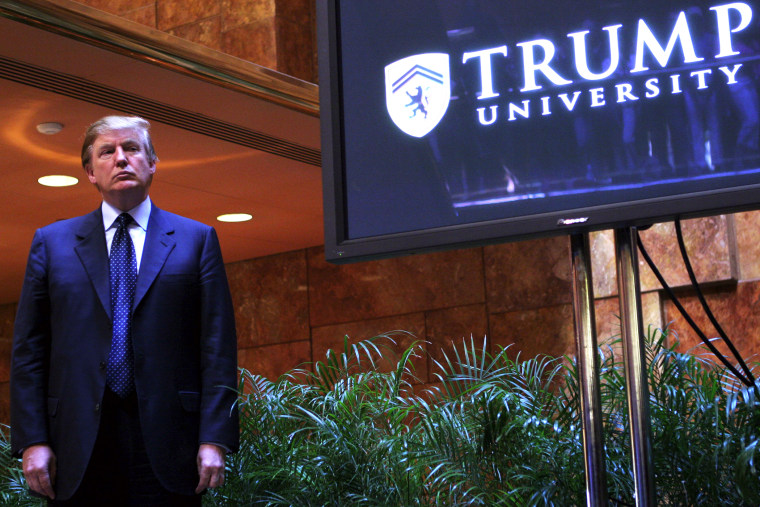One of the political problems surrounding the "Trump University" controversy is the lack of a compelling defense. There's a fair amount of evidence that Donald Trump's program made quite a bit of money through deceptive business practices, creating a "university" that some students and even some employees considered an elaborate "scam."
For the presumptive Republican presidential nominee, it's a bit of a disaster: the publicly available details paint Trump as a literal con man. He and his operation stand accused of stuffing their own pockets by preying on the vulnerable. selling unsuspecting students snake oil at indefensible prices and through misleading claims.
Trump's first defense, rolled out last week, was to
go after the federal judge overseeing the civil suit against "Trump University," falsely accusing him of being a "Mexican." His second defense came yesterday, in the form of video testimonials from former "students" who enjoyed their experience at the "school." The good news is, there's nothing racially charged about the video, but the bad news, as Media Matters
noted, is that this new defense has itself been characterized as a "scam."
RedState, which termed the video a "scam," noted that two of the three former students shown in the video, Kent Moyer and Casey Hoban, do not appear to currently work in real estate, and that at least one of the students, Hoban, may have "an ongoing business and personal relationship with the Trump family." ... The third student, Michelle Gunn, is a real estate investor who has previously given a testimonial for an unrelated self-help workshop. As USA Today reported, Gunn also "manages her college-aged son, Houston, who wrote a book at 13, Schooled for Success: How I Plan to Graduate from High School a Millionaire. It was endorsed by Donald Trump." In addition to what RedState and USA Today reported, in 2013 both Michelle and Houston appeared in yet another testimonial, which mentioned the release of the book and Trump's endorsement. Houston Gunn's website, Facebook page, and Twitter profile also feature photos of Gunn and Trump together.
The Trump campaign described these students as "representative of the many students who were overwhelmingly satisfied with Trump University," but the details suggest that isn't an entirely fair description.
Making matters worse, Team Trump isn't done going after U.S. District Judge Gonzalo Curiel. The
Washington Post reported overnight:
Katrina Pierson, a spokeswoman for Trump, has expanded on the accusations of bias, wrongly suggesting Curiel is part of a group organizing protests at Trump rallies around California. Curiel is a member of the San Diego La Raza Lawyers Association, a professional group that she appeared to confuse with the National Council of La Raza, an advocacy group.
Is it too late for Trump to say he was out of the loop, and he had no meaningful role in the "university" that used his name for branding purposes? I'm afraid so. Not only was the GOP candidate
"personally involved" with the school's controversial marketing strategy, but Trump also
personally lobbied a Better Business Bureau official about the "university's" poor rating.
At a debate in March, Trump said he and his team "didn't care" about the BBB rating. This, like so many other of the candidate's claims, was apparently untrue.
